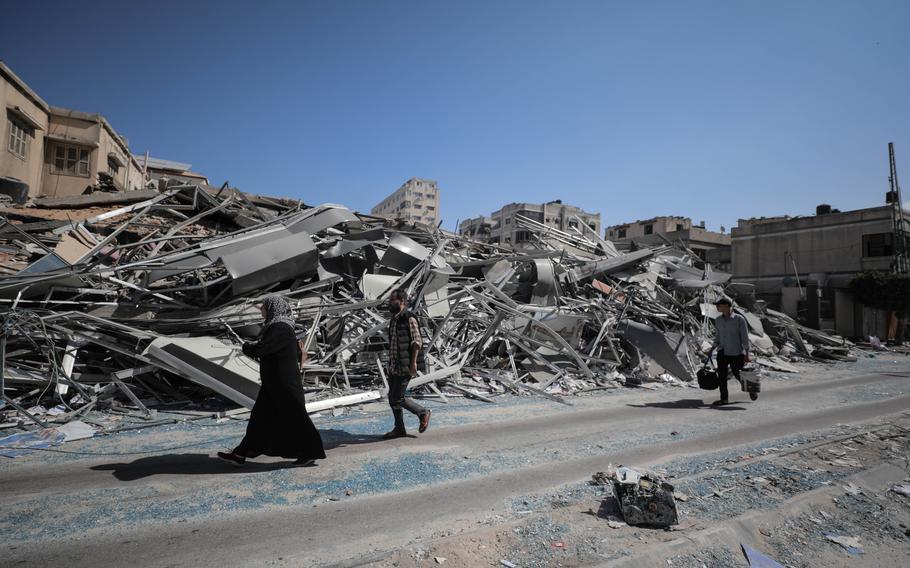
Palestinian families evacuate their homes Oc. 13, 2023, after the Israeli military warned that more than 1 million people in northern Gaza should evacuate south within 24 hours. (Loay Ayyoub for The Washington Post)
Ordinarily, the flurry of messages among the far-flung members of the Elagha family fly thick and fast. But in the days since Israel shut off electricity and fuel to Gaza, the flow of information reaching Yasmeen Elagha’s phone has slowed to a trickle.
Ten members of her extended family, ages 1 to 62, were killed in a single airstrike that hit their home Wednesday morning. Yasmeen, a law student in Chicago, learned of their deaths through a cousin in Ireland.
That evening, she saw a video on Telegram of destroyed buildings in her grandparents’ neighborhood. She waited through an agonizing night to hear that they were still alive. Family members remain trapped in Gaza, mostly in the southern city of Khan Younis.
“Right now I have to savor the moments that I can talk to them, because I don’t know at what point I will no longer hear from them,” she said. “My grandparents are pretty old. They’re at a point, unfortunately, where they’ve just accepted what’s going to happen.”
Palestinians throughout the world, unable or struggling to contact loved ones in Gaza, are watching reports of the war unfolding with a kind of helpless horror.
“We’re all on edge trying to get the latest,” said Dorgham Abusalim, a Palestinian writer in Washington who has parents and other family members trapped in the enclave. “And just to make sure that we hear their voice, and that they hear our voice.”
Israel on Friday warned civilians in northern Gaza, home to roughly half of the strip’s more than 2 million people, to move south ahead of an expected ground invasion. Israel has imposed a siege on the densely populated enclave, shutting down the border and blocking food, fuel and electricity.
Hamas, the militant group that controls the Gaza Strip and has been designated a terrorist organization by the United States and other governments, on Oct. 7 carried out the deadliest-ever attack on Israel, which killed at least 1,300. Retaliatory strikes by Israel have killed at least 2,329 in Gaza, authorities there say.
“Most people in Gaza are just trying to live their day-to-day life,” Elagha said. “It’s completely misunderstood, completely false, that we would want to harm Jews — that is not what any of us want.”
Zarefah Baroud says her grandparents were forced into refugee camps in Gaza upon the establishment of Israel in 1948. Seventy-five years later, she says, most of their descendants remain in or around those refugee camps.
Baroud, 24, from Seattle, is a digital media associate with the American Muslims for Palestine advocacy group. Six of her family members — an aunt and five cousins between the ages of 9 and 18 — were killed in an Israeli airstrike Monday.
“My cousins were beautiful, and so sweet,” she said.
She had just seen a video on Instagram in which another cousin was visible at a hospital. “That’s how we found out, because no one can contact us,” she said.
Gaza’s sole power plant ran out of fuel and stopped operating Wednesday, Palestinian authorities said. Most in the territory are now relying on whatever solar power and generator fuel they might have.
The family of Scotland’s first minister, Humza Yousaf, are distraught over the plight of his in-laws, who are stranded in Gaza with their food and water supply nearly running out. His wife’s parents live in Dundee but had traveled to Gaza days before the violence to visit his father-in-law’s ailing mother.
Yousaf was being interviewed at his official residence in Edinburgh on Thursday when his wife entered the room crying, the Guardian reported. She had seen a news report on a strike on a neighborhood near where her parents were staying and was unable to reach them.
Her mother was eventually able to get a message through to tell them they were not hit, the Guardian reported.
Israa Almudallal in Turkey has attempted to contact family members with little success. Phone lines are down and cellphones have died.
“I have tried all their numbers millions of times,” she said through tears.
On Thursday, she received a WhatsApp message telling her they were alive.
Her worry is compounded by a feeling of helplessness at not being able to do anything for them. “Forgive me,” she has messaged. But she doesn’t know when or if it will be read.
Abusalim, 34, has heard from his parents in Gaza “three or four times” since Saturday. Born in the strip, he won a scholarship to study in the United States when he was 16 and is now lives in Washington.
He was in Gaza during the conflict in 2014 that killed over 2,000 Palestinians and dozens of Israelis. “We have been dehumanized for so long that it seems now so casual to kill Palestinians in Gaza,” he said.
Abusalim said his father, who is in his 80s, is partially paralyzed after a stroke and has been suffering diabetic attacks in the past week for lack of treatment. Abusalim’s mother, in her 60s, is blind.
“The telecommunication system is just completely, at this point, a blackout,” he said. “I’m very, very worried.”